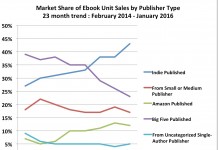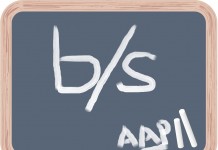 As publishers continue to drag their names through the mud by glomming onto agency pricing, The Bookseller is reporting that Kindle customers are venting angry sentiments on the Kindle fora in the UK. Stephen King’s Just After Sunset, for example, has been priced at £17.99 for the ebook as opposed to £4.99 for the paperback.
As publishers continue to drag their names through the mud by glomming onto agency pricing, The Bookseller is reporting that Kindle customers are venting angry sentiments on the Kindle fora in the UK. Stephen King’s Just After Sunset, for example, has been priced at £17.99 for the ebook as opposed to £4.99 for the paperback.
In some cases customers are voting with their wallets, as Stephen Fry’s The Fry Chronicles has dropped out of the top 20.
As to piracy:
Forum member Lexi noted: “Prices like that are a welcome mat put out for pirates . . . I’m not sure publishers are at all up to speed with e-books. They’re acting like they are a fad which will go away, and needn’t be taken too seriously.”
Other users suggested this move could lead to greater book piracy. Caroline P said: “I can’t believe I’m saying this . . . because I have never ever downloaded files illegally. Not even once. And now I’m considering it. Because if publishers want to rip ME off, maybe it’s not so wrong to rip them off?”
L Barham added: “In the meantime the only real way to fight back is to start looking on the bit torrent sites for the novels one wants to read and if the publishers don’t like it . . . well they chose in much the same way as the music industry the way they wanted to go! Not many records are sold today but we all know the music we like and we all listen to it.”


































Just After Sunset had its price changed sometime in the past day. The Kindle edition is now only £4.49.
Of course, there are still lots of Agency priced Kindle books that have a RRP far above the paperback price. e.g. James May’s Car Fever: http://www.amazon.co.uk/dp/B003LPV5K0/
Kindle: £17.99
Paperback: £4.99 (reduced from £7.99)
I’d suggest that piracy is not the proper response to the BPH’s price-fix ploy. It’s not that they don’t deserve it, but rather that it doesn’t go far enough. All it does is deprive them of revenue which they can justify to their stockholders by blaming “evil” pirates and the tough economic situation.
Rather, I would suggest that a total boycott of their offerings in both ebook and print editions if broadly adopted would get their attention as it shifts your money from the idiot BPHs to more rational publishers. Hard to blame lost sales on piracy if the competition is flourishing.
Let’s face it, specific books are not indispensable.
We won’t die if we don’t pick up the latest over-hyped/overpriced volume; there’s plenty off worthy content from worthy publishers that can better use the market share. We can move on and buy from a more rational publisher and wait for the current BPH executives to vest their golden parachutes and leave.
There is a third path; its not just a choice between meekly taking whatever they feel like dishing out or turning pirate. We can stick it to the price fixers *and* reward the good guys and save money at the same time.
I’d add to Felix Torres excellent comment this one detail: Take a moment to post the following on any overpriced book’s page.
“Sorry. Too pricey. Plenty of other things to read. You lost an impulse sale, and chances are I’ll never be back to this page.”
Whether or not it changes their practices, it’ll definitely make you feel better.
Response on the Bookseller site
By Isobel Akenhead, Senior Editor, Hodder & Stoughton
As you will see on Amazon, JUST AFTER SUNSET is priced at £4.49 on Amazon, which is actually 50p less than the paperback. While we can assume there was a brief anomaly in pricing prior to this article being written, we hope that consumers will bear in mind that whenever this sort of thing happens, it is almost always just a minor error. Ebooks are being priced according to the price of the prevailing edition (be that hardback or paperback at the time) and we are working closely with Amazon to ensure this is always the case – not least so we can be sure that whenever any pricing errors happen, they are cleared up immediately, so e-consumers are not disadvantaged.
Funny they never seem to be underpriced………. 😉
Right, if they were ‘errors’ sometimes they would be underpriced at random.
e.g. Gary Gibson pointed out on twitter that the price on Hannu Rajaniemi’s The Quantum Thief has now been raised to higher than the paperback price.
If you believe that wasn’t deliberate, I have some Uluru riverfront property to sell you.
The Greed Strikes Back… agency pricing was first billed by some publishers blogs as a way to save customer money, even citing (back in March) that eBooks below $10 were by far the most popular. What happened to make them forget this small fact?
One begins to suspect that publishers are trying to make eBooks ‘go away’. Watch for paperback prices tumbling, trying to tempt folks back; if eBook stats fall away or become sluggish, then paper book prices will be back up.
When will publishers learn that they can’t charge the same (or greater) price for an ebook edition than the current lowest priced print edition and expect to make any sales?
If a book comes out in hardback they should simultaneously release the ebook, at about half the hardback price, later if a trade paperback edition is released the ebook price should immediately drop to half that price and the same thing again if/when a mass market pb edition is released.
To price an ebook at the same or more than the original hardback price is dumb to begin with (hardback buyers are not likely to consider an ebook version no matter what its price), but to then keep the ebook at that price once it has been supplanted by a cheaper print edition is simply madness. And the fact that the ebook edition comes wrapped up in value-destroying DRM nonsense is simply a final insult to their customers.
Ripping off and insulting your customers is no way to run a business. The problem is that publishers don’t really comprehend that thanks to the internet the reader is now their customer, not the bookseller as in the past.
David, the publishers won’t learn that if the customers go ahead and buy the e-books anyway. John Sargent has said that he expects that Macmillan will basically be using market pricing for e-books: they’ll charge whatever the people will pay.
The current poster child for market pricing is Ken Follett’s “Fall of Giants”. An e-book priced at $19.99, higher than the street price of the hardcover or even the audiobook, it has been a monster seller for Penguin. For the first week or so it was in the top ten, and after over a month it’s still in the top twenty (as I write this, it’s the #18 best-selling e-book at Amazon).
You might personally be outraged and refuse to buy e-books priced more than the paper copies, and you might personally be incensed about DRM, but it appears that the masses don’t care. Money talks, and the publishers are listening.
Congratulations, you are turning legitimate customers into pirates. Probably time to change your business model… or become obsolete. You decide.
Check + for piracy! it DOESNT hurt anyone and evens the score to boot.